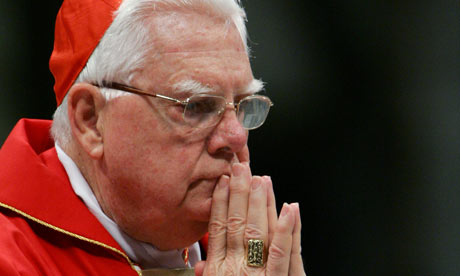By Andrew Brown
Guardian
March 17, 2010
http://www.guardian.co.uk/commentisfree/2010/mar/17/pope-benedict-cardinal-bernard-law
 |
| Cardinal Bernard Law was given a job in Rome after accusations of sex abuse in Boston, where he is wanted by a grand jury. Photo by Thomas Coex |
There is not very much that Pope Benedict XVI can do to rescue the church from the crisis over sexual abuse. The reforms which would make a practical difference have already been put in place, and he deserves some credit for that – he will not get it. The scandals emerging are all from the 1970s or 1980s but in the popular imagination they might as well be happening now. Many of the most eloquent attacks on the church, such as that from Christopher Hitchens in a recent article in Slate magazine, come from enemies who would never give it the benefit of doubt, and for the moment public opinion is with them.
The Catholic church has been framed as an institution for paedophiles, and truth is no defence to that perception. Even in Britain, where all the big scandals involving children being abused or even murdered have involved state care and secular institutions, and where according to Camila Batmanghelidjh more than half a million children are brought to the attention of the social services every single year and most of these are ignored to keep the figures looking good, there's no doubt that the Catholic church is written about as a more serious threat to the children in its care.
Less than half of 1% of the Catholic clergy in the UK over the last three decades or so have been accused of child abuse. That's too many, of course. Nor do such comparative statistics suggest that two wrongs make a right. But they do show that two wrongs don't make one wrong even if there is only one wrong in the news.
However, there is one gesture which a pope might make to improve things. The trouble is that Pope Benedict is not the pope who could. What has driven a great deal of the outrage is the perception that the church placed itself above the secular law. Well it does. As a global institution, it must. Otherwise it has no more moral worth than Google or News International, or any other multinational which will do business wherever it is profitable. And – especially under the Polish pope John Paul II who fought so hard against communism – the church's moral worth was validated by its utter refusal to bend to the standards of the society around it.
This alone explains Benedict's otherwise inexplicable and indefensible decision to give a job in Rome to Cardinal Bernard Law, who presided over terrible scandals in Boston and is wanted by a grand jury. A pope who wished to end the crisis would sack Law, and order him to return to face the grand jury. He would declare that secular society had been morally more advanced than the church over child abuse. That would be the last act in the long process of opening the church to the good things of the world which the second Vatican council set in motion in the 1960s. Ratzinger was an enthusiastic liberal then. It would take a miracle for him to return to that faith, and without it, the modern world will no longer trust his church.
Any original material on these pages is copyright © BishopAccountability.org 2004. Reproduce freely with attribution.